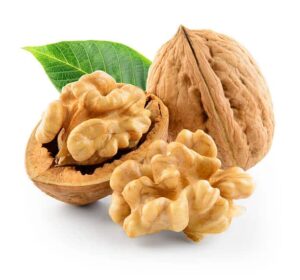Walnuts (Juglans regia) are not only a tasty snack but also pack a nutritional punch with their rich array of essential nutrients. Beyond their delicious flavor and crunchy texture, walnuts have been linked to numerous health benefits. This article explores the scientific evidence supporting the consumption of walnuts for overall well-being.
Heart Health
 Several studies have shown that incorporating walnuts into the diet may improve heart health. Walnuts are rich in alpha-linolenic acid (ALA), a type of omega-3 fatty acid, which has been associated with a reduced risk of heart disease. Research published in the American Journal of Clinical Nutrition suggests that regular walnut consumption can lower levels of LDL cholesterol (the “bad” cholesterol) and improve endothelial function, which is essential for maintaining healthy blood vessels.
Several studies have shown that incorporating walnuts into the diet may improve heart health. Walnuts are rich in alpha-linolenic acid (ALA), a type of omega-3 fatty acid, which has been associated with a reduced risk of heart disease. Research published in the American Journal of Clinical Nutrition suggests that regular walnut consumption can lower levels of LDL cholesterol (the “bad” cholesterol) and improve endothelial function, which is essential for maintaining healthy blood vessels.
Moreover, walnuts are a rich source of antioxidants, including vitamin E and polyphenols, which help protect the delicate linings of blood vessels from oxidative damage. This antioxidant-rich profile contributes to improved endothelial function, allowing blood vessels to relax and dilate more efficiently, thus promoting healthy blood flow and optimal blood pressure levels.
Additionally, walnuts contain a balanced ratio of omega-6 to omega-3 fatty acids, which is important for maintaining optimal heart function and reducing the risk of cardiovascular disease.
Brain Health
 Walnuts are often referred to as “brain food” due to their high omega-3 fatty acid content, which is crucial for brain function. Studies have suggested that consuming walnuts may help support cognitive function and reduce the risk of age-related cognitive decline. A study published in the Journal of Nutrition, Health & Aging found that older adults who consumed walnuts showed improved memory and cognitive flexibility compared to those who did not include walnuts in their diet.
Walnuts are often referred to as “brain food” due to their high omega-3 fatty acid content, which is crucial for brain function. Studies have suggested that consuming walnuts may help support cognitive function and reduce the risk of age-related cognitive decline. A study published in the Journal of Nutrition, Health & Aging found that older adults who consumed walnuts showed improved memory and cognitive flexibility compared to those who did not include walnuts in their diet.
Apart from being rich in omega-3 fatty acids, walnuts also contain antioxidants, vitamin E, and polyphenols, which have neuroprotective properties. These compounds help combat oxidative stress and inflammation in the brain, which are believed to contribute to the development of neurodegenerative diseases like Alzheimer’s and Parkinson’s.
Furthermore, walnuts contain compounds like melatonin and serotonin precursors, which play a role in regulating sleep patterns and mood. Adequate sleep and positive mood are essential factors in maintaining optimal cognitive function and mental well-being. The combination of these nutrients and bioactive compounds in walnuts makes them a valuable addition to a brain-healthy diet, supporting not only cognitive function but also overall mental and emotional resilience.
Weight Management
 Despite being energy-dense, walnuts may actually aid in weight management when consumed as part of a balanced diet. The combination of protein, fiber, and healthy fats in walnuts helps promote satiety, keeping hunger at bay and potentially reducing overall calorie intake. Research published in the European Journal of Nutrition suggests that incorporating walnuts into a weight loss diet may lead to greater reductions in body weight and waist circumference compared to a control diet.
Despite being energy-dense, walnuts may actually aid in weight management when consumed as part of a balanced diet. The combination of protein, fiber, and healthy fats in walnuts helps promote satiety, keeping hunger at bay and potentially reducing overall calorie intake. Research published in the European Journal of Nutrition suggests that incorporating walnuts into a weight loss diet may lead to greater reductions in body weight and waist circumference compared to a control diet.
Furthermore, walnuts offer unique properties that make them especially beneficial for weight management. Unlike many high-calorie foods that are low in nutrients, walnuts are nutrient-dense, meaning they provide a wealth of essential vitamins, minerals, and antioxidants alongside their calorie content. This nutrient density is crucial for supporting overall health and metabolic function while ensuring that the body receives the necessary nutrients to thrive, even during calorie restriction.
In addition to their nutrient density, walnuts contain a combination of bioactive compounds that contribute to their weight management benefits. For example, walnuts are rich in polyunsaturated fatty acids, including alpha-linolenic acid (ALA), which has been linked to improvements in metabolic health and insulin sensitivity. Moreover, walnuts contain phytochemicals such as ellagic acid and quercetin, which have been shown to have anti-inflammatory and anti-obesity effects, potentially influencing body composition and weight regulation.
Antioxidant Properties
 Walnuts are a rich source of antioxidants, including polyphenols and vitamin E, which help protect cells from oxidative damage caused by free radicals. These antioxidants play a vital role in reducing inflammation and preventing chronic diseases such as cancer and cardiovascular disease.
Walnuts are a rich source of antioxidants, including polyphenols and vitamin E, which help protect cells from oxidative damage caused by free radicals. These antioxidants play a vital role in reducing inflammation and preventing chronic diseases such as cancer and cardiovascular disease.
Notably, walnuts are one of the few nuts that contain significant levels of alpha-linolenic acid (ALA), a plant-based omega-3 fatty acid. ALA is known for its potent antioxidant properties, which contribute to the overall antioxidant capacity of walnuts. This omega-3 fatty acid, along with other antioxidants found in walnuts, such as ellagic acid and melatonin, synergistically combat oxidative stress and protect cellular structures from damage.
Moreover, the bioavailability of antioxidants in walnuts is enhanced by their rich lipid content. The healthy fats present in walnuts act as carriers, facilitating the absorption and transportation of antioxidants throughout the body. This lipid-based delivery system ensures that the antioxidants present in walnuts reach target tissues effectively, where they can exert their protective effects against oxidative damage. Additionally, the presence of natural compounds like juglone and quinone derivatives in walnuts contributes to their antioxidant capacity, enhancing their ability to scavenge free radicals and neutralize harmful reactive oxygen species (ROS).
Gut Health
 The fiber content in walnuts, along with their prebiotic properties, can support gut health by promoting the growth of beneficial bacteria in the digestive system. This can contribute to improved digestion, regular bowel movements, and overall gut function. A study published in The Journal of Nutritional Biochemistry found that walnut consumption increased levels of beneficial bacteria, such as Lactobacillus and Ruminococcaceae, in the gut microbiome, which are associated with various health benefits.
The fiber content in walnuts, along with their prebiotic properties, can support gut health by promoting the growth of beneficial bacteria in the digestive system. This can contribute to improved digestion, regular bowel movements, and overall gut function. A study published in The Journal of Nutritional Biochemistry found that walnut consumption increased levels of beneficial bacteria, such as Lactobacillus and Ruminococcaceae, in the gut microbiome, which are associated with various health benefits.
In addition to their fiber content and prebiotic properties, walnuts contain unique bioactive compounds, such as polyphenols and omega-3 fatty acids, which further contribute to gut health. These compounds have been shown to exhibit anti-inflammatory and antioxidant effects within the digestive tract, helping to maintain a balanced gut environment and support the integrity of the intestinal lining.
Furthermore, the combination of healthy fats and nutrients found in walnuts, including vitamin E and magnesium, can help reduce inflammation and oxidative stress in the gut, which are common contributors to gastrointestinal disorders such as irritable bowel syndrome (IBS) and inflammatory bowel disease (IBD). By promoting a healthy gut microbiome and modulating inflammation, walnuts play a crucial role in optimizing digestive health and overall well-being.
Anti-Inflammatory Effects
 Chronic inflammation is linked to the development of many diseases, including cardiovascular disease, diabetes, and certain cancers. The polyphenols and omega-3 fatty acids found in walnuts have anti-inflammatory properties that can help reduce inflammation in the body. Research published in The Journal of Nutrition suggests that regular consumption of walnuts may decrease levels of inflammatory markers, such as C-reactive protein (CRP), in the blood, thereby lowering the risk of chronic inflammatory conditions.
Chronic inflammation is linked to the development of many diseases, including cardiovascular disease, diabetes, and certain cancers. The polyphenols and omega-3 fatty acids found in walnuts have anti-inflammatory properties that can help reduce inflammation in the body. Research published in The Journal of Nutrition suggests that regular consumption of walnuts may decrease levels of inflammatory markers, such as C-reactive protein (CRP), in the blood, thereby lowering the risk of chronic inflammatory conditions.
Moreover, the specific composition of walnuts sets them apart as an exceptional anti-inflammatory food. Unlike many other nuts, walnuts are particularly rich in alpha-linolenic acid (ALA), a type of omega-3 fatty acid that plays a crucial role in modulating the body’s inflammatory response. ALA is a precursor to the production of longer-chain omega-3 fatty acids, such as eicosapentaenoic acid (EPA) and docosahexaenoic acid (DHA), which are known for their potent anti-inflammatory effects. By providing a readily available source of ALA, walnuts offer a unique advantage in combating inflammation and mitigating the risk of chronic inflammatory conditions.
Furthermore, walnuts contain a diverse array of polyphenolic compounds, including flavonoids and phenolic acids, which exhibit antioxidant and anti-inflammatory properties. These bioactive compounds work synergistically with omega-3 fatty acids to neutralize free radicals and inhibit pro-inflammatory pathways in the body. Studies have shown that the combination of omega-3 fatty acids and polyphenols in walnuts confers greater anti-inflammatory benefits compared to isolated nutrients, highlighting the importance of whole food sources like walnuts in promoting overall health and well-being.
Bone Health
Walnuts contain essential minerals like calcium, magnesium, and phosphorus, which are vital for maintaining strong and healthy bones. These minerals contribute to bone density and help prevent conditions like osteoporosis. Additionally, the omega-3 fatty acids in walnuts may have anti-inflammatory effects on bone tissue, potentially reducing the risk of bone-related disorders. A study published in The Journal of Nutritional Biochemistry reported that walnut consumption was associated with improvements in bone mineral density in mice, indicating a potential benefit for human bone health.
Moreover, walnuts stand out for their rich content of phytochemicals, such as polyphenols and flavonoids, which possess antioxidant and anti-inflammatory properties. These compounds play a crucial role in protecting bone health by neutralizing free radicals and reducing oxidative stress, which can contribute to bone loss and degenerative bone diseases. Additionally, emerging research suggests that certain bioactive compounds in walnuts may interact with signaling pathways involved in bone metabolism, promoting bone formation and inhibiting bone resorption.
Furthermore, the combination of nutrients found in walnuts, including vitamin E, potassium, and trace minerals like copper and manganese, supports overall bone health by optimizing bone mineralization and maintaining the structural integrity of bones. Vitamin E, in particular, acts as an antioxidant and helps protect cell membranes in bone tissue from damage, while potassium regulates acid-base balance and may enhance calcium retention in bones.
Skin Health
The vitamin E content in walnuts, along with their antioxidant properties, can benefit skin health by protecting against oxidative damage from UV radiation, pollution, and other environmental factors. Vitamin E is known for its ability to nourish and moisturize the skin, promoting a healthy complexion and reducing the signs of aging, such as wrinkles and fine lines. Including walnuts in your diet can contribute to overall skin health and radiance.
Walnuts also contain omega-3 fatty acids, which play a crucial role in maintaining the skin’s integrity and barrier function. These essential fatty acids help keep the skin hydrated and supple by preventing moisture loss and improving lipid levels in the skin’s outermost layer. By enhancing the skin’s natural lipid barrier, walnuts contribute to a smoother, more resilient complexion and help alleviate dryness and irritation.
Furthermore, the polyphenols found in walnuts exhibit anti-inflammatory properties that can soothe irritated or inflamed skin conditions such as eczema, psoriasis, and acne. These bioactive compounds help reduce redness, swelling, and itching associated with inflammatory skin conditions, promoting a calmer and more balanced complexion.
Diabetes Management
Despite being energy-dense, walnuts have a low glycemic index (GI), meaning they cause a slower and lower rise in blood sugar levels compared to high-GI foods. Including walnuts in meals or snacks can help stabilize blood sugar levels and improve insulin sensitivity, making them a beneficial addition to the diet for individuals with diabetes or those at risk of developing the condition. Research published in Diabetes Care suggests that incorporating walnuts into a meal may improve postprandial glycemic control in individuals with type 2 diabetes.
In addition to their low glycemic index, walnuts offer several unique properties that make them particularly beneficial for diabetes management. Firstly, walnuts are rich in polyunsaturated fats, including omega-3 fatty acids, which have been shown to improve lipid profiles and reduce the risk of cardiovascular disease in individuals with diabetes. Studies have demonstrated that incorporating omega-3-rich foods like walnuts into the diet can help lower levels of triglycerides and LDL cholesterol, which are known risk factors for heart disease in diabetic patients.
Furthermore, walnuts are a good source of fiber, with each one-ounce serving providing about 2 grams of dietary fiber. Fiber plays a crucial role in regulating blood sugar levels by slowing down the absorption of glucose in the bloodstream and promoting satiety, which can help prevent spikes in blood sugar after meals. The combination of healthy fats, fiber, and antioxidants found in walnuts makes them a valuable addition to the diet for individuals with diabetes, as they can help improve glycemic control, reduce the risk of cardiovascular complications, and support overall metabolic health.
Cancer Prevention
The bioactive compounds found in walnuts, including polyphenols, phytosterols, and omega-3 fatty acids, have been studied for their potential anti-cancer properties. These compounds may help inhibit the growth and spread of cancer cells and reduce the risk of certain types of cancer, including breast, prostate, and colorectal cancer. A meta-analysis published in Nutrition Reviews concluded that nut consumption, including walnuts, was inversely associated with the risk of colorectal cancer.
Walnuts stand out among nuts for their exceptional composition of bioactive compounds that contribute to their anti-cancer properties. Polyphenols, such as ellagic acid and flavonoids, exhibit potent antioxidant effects, neutralizing free radicals and reducing oxidative stress, which is linked to cancer development. Phytosterols found in walnuts have been shown to inhibit tumor growth and suppress cancer cell proliferation by interfering with cholesterol metabolism, particularly in hormone-sensitive cancers like breast and prostate cancer.
Moreover, walnuts are one of the richest dietary sources of omega-3 fatty acids, particularly alpha-linolenic acid (ALA). These essential fatty acids play a crucial role in modulating inflammation and immune responses, which are key factors in cancer progression. Studies have suggested that ALA may exert anti-cancer effects by regulating gene expression involved in cell proliferation, apoptosis (programmed cell death), and angiogenesis (formation of new blood vessels to support tumor growth). The unique combination of polyphenols, phytosterols, and omega-3 fatty acids in walnuts synergistically contributes to their potential in cancer prevention and management.
Eye Health
Walnuts contain nutrients like vitamin E, zinc, and antioxidants such as lutein and zeaxanthin, which are beneficial for eye health. These nutrients help protect the eyes from age-related macular degeneration (AMD) and cataracts by reducing oxidative stress and inflammation in the eye tissues. Including walnuts in your diet can support long-term eye health and reduce the risk of vision-related disorders as you age.
Moreover, walnuts stand out as an excellent source of alpha-linolenic acid (ALA), a type of omega-3 fatty acid crucial for maintaining optimal eye function. ALA is known for its anti-inflammatory properties, which can help alleviate eye discomfort and reduce the risk of chronic eye conditions. Additionally, the rich content of polyphenols in walnuts contributes to their protective effects on ocular tissues, shielding the delicate structures of the eye from oxidative damage and promoting overall visual well-being.
Furthermore, the bioavailability of nutrients in walnuts, particularly vitamin E and zinc, enhances their efficacy in supporting eye health. Unlike synthetic supplements, the natural form of these nutrients in walnuts is readily absorbed by the body, ensuring maximum benefits for ocular tissues.
Improved Mood and Stress Reduction
The omega-3 fatty acids found in walnuts play a crucial role in brain health and mood regulation. Studies have suggested that consuming omega-3-rich foods like walnuts may help improve mood, reduce symptoms of depression and anxiety, and enhance overall emotional well-being. Additionally, the antioxidants and other bioactive compounds in walnuts may help protect brain cells from oxidative stress and support cognitive function, contributing to a healthier mind.
Unlike some other sources of omega-3 fatty acids, walnuts contain predominantly alpha-linolenic acid (ALA), which is converted into other omega-3 fatty acids, such as eicosapentaenoic acid (EPA) and docosahexaenoic acid (DHA), in the body. These long-chain omega-3 fatty acids are crucial for maintaining optimal brain function and neurotransmitter balance, which play a vital role in regulating mood and emotional well-being.
Furthermore, walnuts are rich in polyphenols, plant compounds with antioxidant and anti-inflammatory properties that have been linked to improved mood and cognitive function. These polyphenols, along with other bioactive compounds like melatonin and serotonin precursors, contribute to the overall neuroprotective effects of walnuts. By reducing inflammation, enhancing antioxidant defenses, and promoting the synthesis of neurotransmitters involved in mood regulation, walnuts offer a multifaceted approach to supporting mental health and emotional resilience.
Nutritional value per 100 grams of walnuts
- Calories: 654 kcal
- Protein: 15.23 g
- Fat: 65.21 g
- Saturated Fat: 6.126 g
- Monounsaturated Fat: 8.933 g
- Polyunsaturated Fat: 47.174 g
- Carbohydrates: 13.71 g
- Dietary Fiber: 6.7 g
- Sugars: 2.61 g
- Vitamins:
- Vitamin A: 20 IU
- Vitamin C: 1.3 mg
- Vitamin E: 0.7 mg
- Vitamin K: 2.7 µg
- Thiamin (Vitamin B1): 0.341 mg
- Riboflavin (Vitamin B2): 0.15 mg
- Niacin (Vitamin B3): 1.125 mg
- Vitamin B6: 0.537 mg
- Folate (Vitamin B9): 98 µg
- Choline: 0.3 mg
- Betaine: 0.1 mg
- Minerals:
- Calcium: 98 mg
- Iron: 2.91 mg
- Magnesium: 158 mg
- Phosphorus: 346 mg
- Potassium: 441 mg
- Sodium: 2 mg
- Zinc: 3.09 mg
- Copper: 1.542 mg
- Manganese: 3.414 mg
- Selenium: 4.9 µg
- Other:
- Water: 4.07 g
- Ash: 2.33 g
These values are approximate and can vary slightly depending on factors such as the variety of walnuts and how they are processed.
Conclusion
Incorporating walnuts into your diet can be a simple and delicious way to boost your overall health. From promoting heart and brain health to aiding in weight management and providing powerful antioxidants, the nutritional benefits of walnuts are backed by scientific research. Whether enjoyed as a snack, added to salads or oatmeal, or used in baking, walnuts are a versatile ingredient that can contribute to a well-rounded and nutritious diet.
 We invite you on a vibrant and flavorful culinary adventure with Jamie Oliver’s Beans, Goat Cheese and Walnuts on Pastry. This dish combines the freshness of beans, the creamy richness of goat cheese, and the nutty crunch of walnuts, all served on hearty sourdough bread. It’s a celebration of seasonal produce and simple yet delicious ingredients that come together to create a satisfying meal or snack.
We invite you on a vibrant and flavorful culinary adventure with Jamie Oliver’s Beans, Goat Cheese and Walnuts on Pastry. This dish combines the freshness of beans, the creamy richness of goat cheese, and the nutty crunch of walnuts, all served on hearty sourdough bread. It’s a celebration of seasonal produce and simple yet delicious ingredients that come together to create a satisfying meal or snack.
Contraindications to consuming walnuts
Allergies: Individuals with tree nut allergies should avoid consuming walnuts as they may experience allergic reactions, ranging from mild itching or swelling to severe anaphylaxis.
Gastrointestinal Issues: Some people may experience digestive discomfort, such as bloating, gas, or diarrhea, after consuming walnuts, particularly if they have irritable bowel syndrome (IBS) or other gastrointestinal conditions.
Caloric Intake: While walnuts offer numerous health benefits, they are calorie-dense and high in fat. Overconsumption of walnuts, especially when not balanced with other nutrients, may contribute to weight gain or interfere with weight loss goals.
Omega-3 Interactions: Individuals taking blood-thinning medications or supplements, such as warfarin or aspirin, should exercise caution when consuming walnuts due to their omega-3 fatty acid content, which may increase the risk of bleeding.
Potential Contamination: Walnuts may sometimes be contaminated with mold or toxins called aflatoxins, which can have adverse effects on health, particularly liver health, if consumed in large quantities over time.
Dental Health: Eating walnuts, like many nuts, may pose a risk to dental health by increasing the risk of tooth decay or dental erosion, especially if consumed in large quantities or in sticky, sugary preparations.
It’s essential to consult with a healthcare professional or a registered dietitian if you have specific health concerns or conditions before incorporating walnuts into your diet. Additionally, practicing moderation and being mindful of individual sensitivities or allergies is key to safely enjoying the nutritional benefits of walnuts.
Fascinating Facts About Walnuts
Mysterious Shell Patterning:
One of the most intriguing aspects of walnuts is the intricate and often symmetrical patterning on their shells. These patterns, known as “walnut burls,” are caused by abnormal growth in the tree’s bark layers. While their exact formation is not fully understood, walnut burls are highly prized by woodworkers for their unique and visually stunning appearance when used in furniture and decorative items.
Symbolism and Folklore:
Throughout history, walnuts have been imbued with symbolic meaning and featured prominently in folklore and cultural traditions. In some cultures, walnuts are associated with fertility and abundance, while in others, they symbolize wisdom and enlightenment. In ancient Rome, walnuts were considered a symbol of good luck and were often given as gifts during weddings and other auspicious occasions.
Natural Dyeing Properties:
The hulls of green walnuts contain a potent natural dye that has been used for centuries to color fabrics, yarns, and even hair. When crushed and boiled, the hulls release a dark brown pigment known as “walnut ink,” which was traditionally used by artists and scribes for writing and drawing. Today, eco-conscious artisans continue to harness the dyeing properties of walnuts to create sustainable and environmentally friendly textiles.
Biological Clock Mechanism:
Walnuts possess a unique biological mechanism that allows them to maintain their freshness and quality over an extended period. Encased within their protective shell, walnuts contain enzymes and antioxidants that help delay rancidity and preserve their nutritional integrity. This natural preservation mechanism enables walnuts to remain viable for consumption for several months, making them an ideal pantry staple.
Cultural Culinary Traditions:
In certain cultures, walnuts play a central role in traditional culinary practices and celebrations. For example, in Eastern European cuisines, walnuts are a key ingredient in dishes such as baklava, nut rolls, and walnut-stuffed peppers, symbolizing prosperity and joy. Similarly, in Middle Eastern cuisine, walnuts are often featured in savory dishes like muhammara (a spicy walnut dip) and kibbeh (a meat and bulgur wheat dish), adding richness and texture to the cuisine.
Ecological Importance:
Beyond their culinary and cultural significance, walnuts also play a crucial ecological role as keystone species in their native habitats. Walnut trees provide food and shelter for a diverse array of wildlife, including birds, squirrels, and insects. Additionally, their deep root systems help prevent soil erosion and improve soil fertility, contributing to the overall health and resilience of ecosystems where they grow.
Insect Repellent Properties:
Walnuts contain natural compounds that act as insect repellents, deterring pests from infesting stored grains, fruits, and other food products. In traditional agricultural practices, walnut leaves and husks were often used as natural insecticides to protect crops from insect damage. Additionally, the strong aroma of crushed walnut leaves can help ward off mosquitoes and other insects when placed around outdoor seating areas.
Phenomenon of Self-Pollination:
Unlike many other nut-bearing trees that rely on cross-pollination between separate male and female trees, some walnut tree varieties exhibit a rare phenomenon known as “self-pollination.” This means that a single walnut tree can produce both male and female flowers, allowing it to pollinate itself and produce viable nuts without the need for nearby pollen sources. This unique reproductive strategy contributes to the resilience and adaptability of walnut trees in various environments.
Traditional Medicinal Uses:
In traditional medicine systems around the world, various parts of the walnut tree, including the leaves, bark, and green hulls, have been used for their medicinal properties. Extracts derived from walnut leaves were believed to have astringent and anti-inflammatory properties and were used topically to treat skin conditions such as eczema and dermatitis. Additionally, walnut bark was used in herbal preparations for its potential antiparasitic and antimicrobial effects.
Symbolism in Art and Literature:
Walnuts have been depicted symbolically in art, literature, and religious iconography throughout history. In Renaissance art, walnuts often appeared in religious paintings as a symbol of divine wisdom and enlightenment, representing the human brain and the pursuit of knowledge. Likewise, in literature and folklore, walnuts have been associated with themes of fertility, abundance, and mystery, serving as potent symbols in myths, legends, and allegorical tales.
Nutrient Recycling in Ecosystems:
The decomposition of fallen walnut leaves and husks plays a vital role in nutrient cycling and soil fertility within forest ecosystems. As these organic materials break down, they release valuable nutrients such as nitrogen, phosphorus, and potassium back into the soil, providing essential nourishment for plant growth and supporting the diverse array of plant and animal life in the ecosystem. This process of nutrient recycling underscores the ecological importance of walnuts in sustaining healthy forest ecosystems.
Cultural Superstitions:
In some cultures, walnuts have been associated with superstitions and folk beliefs. For example, in certain European traditions, it was believed that carrying a walnut in your pocket could ward off evil spirits and bring good luck. Similarly, cracking open a walnut with a single, clean break was considered a sign of good fortune and success, while a shattered or splintered nut was seen as an omen of misfortune.
To explore more plants, please visit our page about plants
References
- Ros, Emilio. “Health Benefits of Nut Consumption.” Nutrients, vol. 2, no. 7, 2010, pp. 652–682.
- Sala-Vila, Aleix, et al. “Walnuts Inhibit the Cardiovascular Response to Stress in Subjects at Risk for Metabolic Syndrome: A Randomized, Controlled Crossover Trial.” The American Journal of Clinical Nutrition, vol. 95, no. 2, 2012, pp. 316–323.
- Arab, Lenore, et al. “A Randomized Controlled Trial of Long-Term (6-Month) Dietary Walnut Supplementation in Hypercholesterolemic Subjects.” The Journal of Nutrition, vol. 140, no. 4, 2010, pp. 760–767.
- O’Neil, Carol E., et al. “A Review of the Nutrient Content of Selected Tree Nuts and Peanuts Compared to the Dietary Recommendations for Nut Consumption.” Nutrients, vol. 7, no. 11, 2015, pp. 9294–9308.
- Sala-Vila, Aleix, et al. “Interplay Between Dietary Polyphenols and Oral and Gut Microbiota in the Development of Colorectal Cancer.” Nutrients, vol. 10, no.
- Holscher, Hannah D., et al. “Walnut Consumption Alters the Gastrointestinal Microbiota, Microbially Derived Secondary Bile Acids, and Health Markers in Healthy Adults: A Randomized Controlled Trial.” The Journal of Nutritional Biochemistry, vol. 56, 2018, pp. 165–175.
- Calder, Philip C. “Omega-3 Fatty Acids and Inflammatory Processes: From Molecules to Man.” Biochemical Society Transactions, vol. 45, no. 5, 2017, pp. 1105–1115.
- Lambert, Joshua D., et al. “Consumption of Walnuts Improves Bone Health in Mice by Decreasing Resorption.” The Journal of Nutrition, vol. 138, no. 4, 2008, pp. 634–638.
- Pham, Hoang Anh, and Bodo Melnik. “Walnuts, Almonds and Other Tree Nuts in the Prevention of Cardiovascular Disease: A Narrative Review.” Vascular Pharmacology, vol. 71, 2015, pp. 303–311.
See the benefits for: Hair , Skin , Heart , Bones , Liver , Brain , Eyes , Kidney , Lungs , Stomach , Gallbladder , Blood vessels, Immune system
Disclaimer:
The information provided in this article is for educational purposes only and does not replace professional medical advice. Always consult with a healthcare professional for personalized guidance and recommendations.
